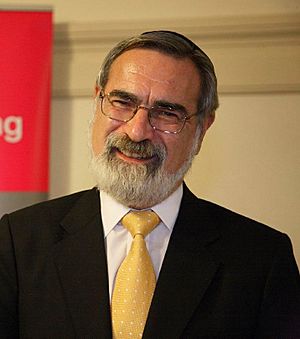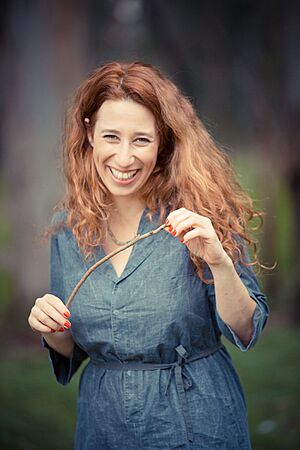Jewish vegetarianism facts for kids
Jewish vegetarianism is when people who are Jewish choose to be vegetarian or vegan. They do this because of their Jewish beliefs. These beliefs often include caring for animals, protecting the environment, being a good person, and staying healthy.
Contents
Vegetarianism in Ancient Times
Long ago, most Jewish people ate meat. However, Jewish laws called kashrut set rules for eating meat. These rules say which animals can be eaten and how they must be prepared. Some rabbis, like Shlomo Ephraim Luntschitz and Abraham Isaac Kook, thought these rules were so complex that they might have been made to make people eat less meat. They also believed kashrut could discourage killing animals.
Early Ideas of Vegetarianism
The Torah talks about vegetarianism as an ideal way to live. In Genesis 1:29, God says that humans and animals should eat only plants. This suggests that in the very beginning, everyone was meant to be vegetarian. Some people believe God later allowed humans to eat meat after the Great Flood. This was seen as a temporary permission because humans were not perfect.
Prophets and Plant-Based Diets
Some writers think the Jewish prophet Isaiah was a vegetarian. They point to parts of the Book of Isaiah that talk about peace and respecting all life. For example, some verses describe a future where even meat-eating animals will eat plants. However, others argue these verses are about animal sacrifices or a future peaceful world, not about human diets.
The prophet Daniel and his friends also chose a plant-based diet. In the Book of Daniel (Daniel 1:8-16), Daniel and three other Jewish youths refused the king's rich food and wine. They asked to eat only vegetables and drink water for ten days. After this time, they looked healthier than the other boys who ate the king's food. They chose this diet because the king's food was not kosher, not because it was not vegan.
Some ancient Jewish groups, like early Karaite sects, did not eat meat. They believed it was forbidden while the Jewish temple was in ruins.
Medieval Jewish Thinkers
Many Jewish scholars in the Middle Ages also saw vegetarianism as a good idea. People like Joseph Albo and Isaac Arama thought it was important for a person's moral character. They worried about how killing animals might affect the person doing the slaughtering. It was even said that Rabbi Asher ben Meshullam never ate meat.
Modern Jewish Vegetarianism
Today, many Jewish people choose to be vegetarian or vegan. They often connect this choice to Jewish values like compassion, health, and protecting the Earth.
Leading Jewish Vegetarians
Many important rabbis and Jewish leaders support vegetarianism or veganism. In 2017, a group called Jewish Veg encouraged all Jews to go vegan. Many famous rabbis signed this statement, including Jonathan Wittenberg, David Wolpe, and David Rosen. Other well-known rabbis who were vegetarian or spoke positively about it include David Cohen and Abraham Isaac Kook. David Cohen wrote an important essay called A Vision of Vegetarianism and Peace. This essay shared Kook's ideas about a future where people would become vegan.
Other famous Jewish vegetarians include writers like Shmuel Yosef Agnon and Isaac Bashevis Singer. Also, former Israeli President Reuven Rivlin and actress Natalie Portman are Jewish vegetarians.
Jewish Vegetarian Cookbooks
The first Jewish-vegetarian cookbook was created by Fania Lewando. It was published in 1938 in Vilnius. An English version of this cookbook came out in 2015.
Groups Promoting Jewish Vegetarianism
Several groups work to spread Jewish vegetarianism:
- Jewish Veg: Started in 1975, this group promotes Jewish vegetarianism. They made a film called A Sacred Duty.
- SHAMAYIM: Jewish Animal Advocacy: Led by Rabbi Dr. Shmuly Yanklowitz, this group encourages a vegan diet. They focus on animal welfare and Jewish spirituality.
- The Jewish Vegetarian Society (JVS): Founded in the 1960s, this group aims for a kinder society where animals are not killed for food.
- Amirim: This is an Israeli vegetarian village founded in 1958. Its founders wanted to create a vegetarian community because they loved animals and cared about their rights.
- The "Concern for Helping Animals in Israel (CHAI)": This animal welfare group also promotes Jewish vegetarianism.
- Behemla: This is a Haredi (Orthodox Jewish) group that speaks out against animal cruelty and supports veganism.
- Animals Now: This Israeli animal rights group promotes Jewish vegetarianism on its website.
- Vegan Friendly: Based in Tel Aviv, this group works to make veganism common. They organize events and promote vegan ways to celebrate Jewish holidays.
Veganism in Israel
Jewish vegetarianism and veganism are very popular in Israel. In 2016, it was said that Israel was "the most vegan country on Earth." About five percent of its people avoided all animal products. This number had more than doubled since 2010. Tel Aviv is especially known as the "vegan capital of the world."
Interest in veganism has grown among all kinds of Jewish people in Israel, including those who are not religious and those who are Orthodox. Rabbi Asa Keisar is an Orthodox rabbi who believes eating meat is no longer allowed because of how animals are treated today. More often, Orthodox rabbis ask Jews to eat less meat to reduce animal suffering.
Why Jewish People Choose Vegetarianism
Modern Jewish vegetarians use several religious and ethical reasons for their choices:
- Compassion for Animals: A key Jewish rule is tza'ar ba'alei hayyim, which means not causing pain to living creatures. While traditional shechita (kosher slaughter) aims to prevent suffering, some argue that modern factory farming and fast-paced slaughterhouses do not follow the true spirit of this rule.
- Avoiding Waste: Another Jewish law is bal tashchit, which forbids waste. Vegetarians point out that producing meat uses much more grain, water, land, and energy than growing plants for food.
- Health: Jewish law also commands people to take care of their health (venishmartem me'od lenafshoteichem). Many Jewish vegetarians believe that a plant-based diet is healthier.
- Protecting the Environment: Jewish vegetarians also care about the environment. They say that eating less meat can help with global warming, world hunger, and saving natural resources.
Different Views on Vegetarianism
Some Jewish interpretations say that a person should not become vegetarian if their main reason is a belief in animal rights. This is because the Torah mentions eating meat many times. It also includes rules for eating meat, like the Passover sacrifice and other animal sacrifices.
However, vegetarianism is allowed for practical reasons. For example, if kosher meat is too expensive or hard to find. It is also allowed for health reasons or if someone simply does not like the taste of meat. Some Orthodox Jews who are usually vegetarian might still eat meat during Sabbath and holiday meals, as this is encouraged by Jewish law.
Some Jews also prefer a middle ground, like being pescetarian (eating fish but no other meat). In 2015, a synagogue in Manchester started The Pescetarian Society. They said that eating fish was an original Jewish diet and a type of vegetarianism.
 | William M. Jackson |
 | Juan E. Gilbert |
 | Neil deGrasse Tyson |





